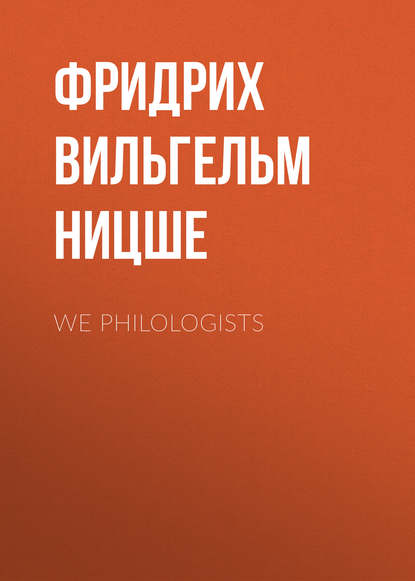 Полная версия
Полная версияПолная версия:
Фридрих Вильгельм Ницше The Dawn of Day
- + Увеличить шрифт
- - Уменьшить шрифт

Friedrich Wilhelm Nietzsche
The Dawn of Day
Introduction
When Nietzsche called his book The Dawn of Day, he was far from giving it a merely fanciful title to attract the attention of that large section of the public which judges books by their titles rather than by their contents. The Dawn of Day represents, figuratively, the dawn of Nietzsche's own philosophy. Hitherto he had been considerably influenced in his outlook, if not in his actual thoughts, by Schopenhauer, Wagner, and perhaps also Comte. Human, all-too-Human, belongs to a period of transition. After his rupture with Bayreuth, Nietzsche is, in both parts of that work, trying to stand on his own legs, and to regain his spiritual freedom; he is feeling his way to his own philosophy. The Dawn of Day, written in 1881 under the invigorating influence of a Genoese spring, is the dawn of this new Nietzsche. “With this book I open my campaign against morality,” he himself said later in his autobiography, the Ecce Homo.
Just as in the case of the books written in his prime —The Joyful Wisdom, Zarathustra, Beyond Good and Evil, and The Genealogy of Morals– we cannot fail to be impressed in this work by Nietzsche's deep psychological insight, the insight that showed him to be a powerful judge of men and things unequalled in the nineteenth or, perhaps, any other century. One example of this is seen in his searching analysis of the Apostle Paul (Aphorism 68), in which the soul of the “First Christian” is ruthlessly and realistically laid bare to us. Nietzsche's summing-up of the Founder of Christianity – for of course, as is now generally recognised, it was Paul, and not Christ, who founded the Christian Church – has not yet called forth those bitter attacks from theologians that might have been expected, though one reason for this apparent neglect is no doubt that the portrait is so true, and in these circumstances silence is certainly golden on the part of defenders of the faith, who are otherwise, as a rule, loquacious enough. Nor has the taunt in Aphorism 84 elicited an answer from the quarter whither it was directed; and the “free” (not to say dishonest) interpretation of the Bible by Christian scholars and theologians, which is still proceeding merrily, is now being turned to Nietzsche's own writings. For the philosopher's works are now being “explained away” by German theologians in a most naïve and daring fashion, and with an ability which has no doubt been acquired as the result of centuries of skilful interpretation of the Holy Writ.
Nor are professional theologians the only ones who have failed to answer Nietzsche; for in other than religious matters the majority of savants have not succeeded in plumbing his depths. There is, for example, the question of race. Ten years ago, twenty years after the publication of The Dawn of Day, Nietzsche's countrymen enthusiastically hailed a book which has recently been translated into English, Chamberlain's Foundations of the Nineteenth Century. In this book the Teutons are said to be superior to all the other peoples in the world, the reason given being that they have kept their race pure. It is due to this purity of race that they have produced so many great men; for every “good” man in history is a Teuton, and every bad man something else. Considerable skill is exhibited by the author in filching from his opponents the Latins their best trump cards, and likewise the trump card, Jesus Christ, from the Jews; for Jesus Christ, according to Chamberlain's very plausible argument, was not a Jew but an Aryan, i. e. a member of that great family of which the Teutons are a branch.
What would Nietzsche have said to this legerdemain? He has constantly pointed out that the Teutons are so far from being a pure race that they have, on the contrary, done everything in their power to ruin even the idea of a pure race for ever. For the Teutons, through their Reformation and their Puritan revolt in England, and the philosophies developed by the democracies that necessarily followed, were the spiritual forbears of the French Revolution and of the Socialistic régime under which we are beginning to suffer nowadays. Thus this noble race has left nothing undone to blot out the last remnant of race in Europe, and it even stands in the way of the creation of a new race. And with such a record in history the Germans write books, eulogising themselves as the salt of the earth, the people of peoples, the race of races, while in truth they are nothing else than nouveaux-riches endeavouring to draw up a decent pedigree for themselves. We know that honesty is not a prerequisite of such pedigrees, and that patriotism may be considered as a good excuse even for a wrong pedigree; but the race-pandemonium that followed the publication of Mr. Chamberlain's book in Germany was really a very unwise proceeding in view of the false and misleading document produced. What, it may be asked again, would Nietzsche have said if he had heard his countrymen screaming odes to their own glory as the “flower of Europe”? He would assuredly have dismissed their exalted pretensions with a good-natured smile; for his study of history had shown him that even slaves must have their saturnalia now and then. But as to his philosophical answer there can be no doubt; for in Aphorism 272 of The Dawn of Day there is a single sentence which completely refutes the view of modern racemongers like Chamberlain and his followers: “It is probable,” we read, “that there are no pure races, but only races which have become purified, and even these are extremely rare.” There are even stronger expressions to be met with in “Peoples and Countries” (Aphorism 20; see the Genealogy of Morals, p. 226): “What quagmires and mendacity must there be about if it is possible, in the modern European hotch-potch, to raise the question of ‘race’!” and again, in Aphorism 21: “Maxim – to associate with no man who takes any part in the mendacious race-swindle.”
A man like Nietzsche, who makes so little impression upon mankind in general, is certainly not, as some people have thought and openly said, a public danger, so the guardians of the State need not be uneasy. There is little danger of Nietzsche's revolutionising either the masses or the classes; for, as Goethe used to say, “Seulement celui qui ressemble le peuple, l'émeut.” Nietzsche's voice has as yet hardly been lifted in this country; and, until it is fully heard, both masses and classes will calmly proceed on their way to the extremes of democracy and anarchy, as they now appear to be doing. Anarchy, though, may be too strong a word; for there is some doubt whether, throughout Europe and America at all events, the people are not now too weak even for anarchy. A revolt is a sign of strength in a slave; but our modern slaves have no strength left.
In the meantime, however, it will have become clear that Nietzsche tried to stop this threatening degradation of the human race, that he endeavoured to supplant the morality of altruism – the cause of this degradation – by another, a super-Christian morality, and that he has succeeded in this aim, if not where the masses and the classes are concerned, at any rate in the case of that small minority of thinkers to which he really wished to appeal. And this minority is naturally grateful to the philosopher for having supplied them with a morality which enables them to be “good” without being fools – an unpleasant combination which, unfortunately, the Nazarene morality is seldom able to avoid. This Nazarene morality has doubtless its own merits, and its “good” and “evil” in many cases coincide with ours; but common sense and certain intellectual qualities are not too highly appreciated in the table of Christian values (see, for instance, 1 Cor. iii. 19), whence it will be observed that the enlightenment of a Christian is not always quite equal to his otherwise excellent intentions. We Nietzschians, however, must show that patience to them which they always pretend to show to their opponents. Nietzsche himself, indeed, recommends this in Aphorism 103 of this book, an aphorism which is almost too well known to need repetition; for it likewise disproves the grotesque though widely circulated supposition that all kinds of immorality would be indulged in under the sway of the “Immoralistic” philosopher:
“I should not, of course, deny – unless I were a fool – that many actions which are called immoral should be avoided and resisted; and in the same way that many which are called moral should be performed and encouraged; but I hold that in both cases these actions should be performed from motives other than those which have prevailed up to the present time. We must learn anew in order that at last, perhaps very late in the day, we may be able to do something more: feel anew.”
In regard to the translation itself – which owes a good deal to many excellent suggestions made by Mr. Thomas Common – it adheres, as a rule, closely to the German text; and in only two or three instances has a slightly freer rendering been adopted in order to make the sense quite clear. There are one or two cases in which a punning or double meaning could not be adequately rendered in English: e. g. Aphorism 50, where the German word “Rausch” means both “intoxication” and also “elation” (i. e. the exalted feelings of the religious fanatic). Again, we have “Einleid,” “Einleidigkeit,” in Aphorism 63– words which do not quite correspond to pity, compassion, or fellow-feeling, and which, indeed, are not yet known to German lexicographers. A literal translation, “one-feeling,” would be almost meaningless. What is actually signified is that both sufferer and sympathiser have nerves and feelings in common: an experience which Schopenhauer, as Nietzsche rightly points out, mistook for compassion or pity (“Mitleid”), and which lacked a word, even in German, until the later psychologist coined “Einleid.” Again, in Aphorism 554 we have a play upon the words “Vorschritt” (leading, guidance) and “Fortschritt” (progress).
All these, however, are trifling matters in comparison with the substance of the book, and they are of more interest to philologists than to psychologists. It is for psychologists that this book was written; and such minds, somewhat rare in our time, may read in it with much profit.
J. M. Kennedy.
London, September 1911.
Author's Preface
In this book we find a “subterrestrial” at work, digging, mining, undermining. You can see him, always provided that you have eyes for such deep work, – how he makes his way slowly, cautiously, gently but surely, without showing signs of the weariness that usually accompanies a long privation of light and air. He might even be called happy, despite his labours in the dark. Does it not seem as if some faith were leading him on, some solace recompensing him for his toil? Or that he himself desires a long period of darkness, an unintelligible, hidden, enigmatic something, knowing as he does that he will in time have his own morning, his own redemption, his own rosy dawn? – Yea, verily he will return: ask him not what he seeketh in the depths; for he himself will tell you, this apparent Trophonius and subterrestrial, whensoever he once again becomes man. One easily unlearns how to hold one's tongue when one has for so long been a mole, and all alone, like him. —
2
Indeed, my indulgent friends, I will tell you – here, in this late preface,1 which might easily have become an obituary or a funeral oration – what I sought in the depths below: for I have come back, and – I have escaped. Think not that I will urge you to run the same perilous risk! or that I will urge you on even to the same solitude! For whoever proceeds on his own path meets nobody: this is the feature of one's “own path.” No one comes to help him in his task: he must face everything quite alone – danger, bad luck, wickedness, foul weather. He goes his own way; and, as is only right, meets with bitterness and occasional irritation because he pursues this “own way” of his: for instance, the knowledge that not even his friends can guess who he is and whither he is going, and that they ask themselves now and then: “Well? Is he really moving at all? Has he still … a path before him?” – At that time I had undertaken something which could not have been done by everybody: I went down into the deepest depths; I tunnelled to the very bottom; I started to investigate and unearth an old faith which for thousands of years we philosophers used to build on as the safest of all foundations – which we built on again and again although every previous structure fell in: I began to undermine our faith in morals. But ye do not understand me? —
3
So far it is on Good and Evil that we have meditated least profoundly: this was always too dangerous a subject. Conscience, a good reputation, hell, and at times even the police, have not allowed and do not allow of impartiality; in the presence of morality, as before all authority, we must not even think, much less speak: here we must obey! Ever since the beginning of the world, no authority has permitted itself to be made the subject of criticism; and to criticise morals – to look upon morality as a problem, as problematic – what! was that not —is that not – immoral? – But morality has at its disposal not only every means of intimidation wherewith to keep itself free from critical hands and instruments of torture: its security lies rather in a certain art of enchantment, in which it is a past master – it knows how to “enrapture.” It can often paralyse the critical will with a single look, or even seduce it to itself: yea, there are even cases where morality can turn the critical will against itself; so that then, like the scorpion, it thrusts the sting into its own body. Morality has for ages been an expert in all kinds of devilry in the art of convincing: even at the present day there is no orator who would not turn to it for assistance (only hearken to our anarchists, for instance: how morally they speak when they would fain convince! In the end they even call themselves “the good and the just”). Morality has shown herself to be the greatest mistress of seduction ever since men began to discourse and persuade on earth – and, what concerns us philosophers even more, she is the veritable Circe of philosophers. For, to what is it due that, from Plato onwards, all the philosophic architects in Europe have built in vain? that everything which they themselves honestly believed to be aere perennius threatens to subside or is already laid in ruins? Oh, how wrong is the answer which, even in our own day, rolls glibly off the tongue when this question is asked: “Because they have all neglected the prerequisite, the examination of the foundation, a critique of all reason” – that fatal answer made by Kant, who has certainly not thereby attracted us modern philosophers to firmer and less treacherous ground! (and, one may ask apropos of this, was it not rather strange to demand that an instrument should criticise its own value and effectiveness? that the intellect itself should “recognise” its own worth, power, and limits? was it not even just a little ridiculous?) The right answer would rather have been, that all philosophers, including Kant himself were building under the seductive influence of morality – that they aimed at certainty and “truth” only in appearance; but that in reality their attention was directed towards “majestic moral edifices,” to use once more Kant's innocent mode of expression, who deems it his “less brilliant, but not undeserving” task and work “to level the ground and prepare a solid foundation for the erection of those majestic moral edifices” (Critique of Pure Reason, ii. 257). Alas! He did not succeed in his aim, quite the contrary – as we must acknowledge to-day. With this exalted aim, Kant was merely a true son of his century, which more than any other may justly be called the century of exaltation: and this he fortunately continued to be in respect to the more valuable side of this century (with that solid piece of sensuality, for example, which he introduced into his theory of knowledge). He, too, had been bitten by the moral tarantula, Rousseau; he, too, felt weighing on his soul that moral fanaticism of which another disciple of Rousseau's, Robespierre, felt and proclaimed himself to be the executor: de fonder sur la terre l'empire de la sagesse, de la justice, et de la vertu. (Speech of June 4th, 1794.) On the other hand, with such a French fanaticism in his heart, no one could have cultivated it in a less French, more deep, more thorough and more German manner – if the word German is still permissible in this sense – than Kant did: in order to make room for his “moral kingdom,” he found himself compelled to add to it an indemonstrable world, a logical “beyond” – that was why he required his critique of pure reason! In other words, he would not have wanted it, if he had not deemed one thing to be more important than all the others: to render his moral kingdom unassailable by – or, better still, invisible to, reason, – for he felt too strongly the vulnerability of a moral order of things in the face of reason. For, when confronted with nature and history, when confronted with the ingrained immorality of nature and history, Kant was, like all good Germans from the earliest times, a pessimist: he believed in morality, not because it is demonstrated through nature and history, but despite its being steadily contradicted by them. To understand this “despite,” we should perhaps recall a somewhat similar trait in Luther, that other great pessimist, who once urged it upon his friends with true Lutheran audacity: “If we could conceive by reason alone how that God who shows so much wrath and malignity could be merciful and just, what use should we have for faith?” For, from the earliest times, nothing has ever made a deeper impression upon the German soul, nothing has ever “tempted” it more, than that deduction, the most dangerous of all, which for every true Latin is a sin against the intellect: credo quia absurdum est. – With it German logic enters for the first time into the history of Christian dogma; but even to-day, a thousand years later, we Germans of the present, late Germans in every way, catch the scent of truth, a possibility of truth, at the back of the famous fundamental principle of dialectics with which Hegel secured the victory of the German spirit over Europe – “contradiction moves the world; all things contradict themselves.” We are pessimists – even in logic.
4
But logical judgments are not the deepest and most fundamental to which the daring of our suspicion descends: the confidence in reason which is inseparable from the validity of these judgments, is, as confidence, a moral phenomenon … perhaps German pessimism has yet to take its last step? Perhaps it has once more to draw up its “credo” opposite its “absurdum” in a terrible manner? And if this book is pessimistic even in regard to morals, even above the confidence in morals – should it not be a German book for that very reason? For, in fact, it represents a contradiction, and one which it does not fear: in it confidence in morals is retracted – but why? Out of morality! Or how shall we call that which takes place in it – in us? for our taste inclines to the employment of more modest phrases. But there is no doubt that to us likewise there speaketh a “thou shalt”; we likewise obey a strict law which is set above us – and this is the last cry of morals which is still audible to us, which we too must live: here, if anywhere, are we still men of conscience, because, to put the matter in plain words, we will not return to that which we look upon as decayed, outlived, and superseded, we will not return to something “unworthy of belief,” whether it be called God, virtue, truth, justice, love of one's neighbour, or what not; we will not permit ourselves to open up a lying path to old ideals; we are thoroughly and unalterably opposed to anything that would intercede and mingle with us; opposed to all forms of present-day faith and Christianity; opposed to the lukewarmness of all romanticism and fatherlandism; opposed also to the artistic sense of enjoyment and lack of principle which would fain make us worship where we no longer believe – for we are artists – opposed, in short, to all this European feminism (or idealism, if this term be thought preferable) which everlastingly “draws upward,” and which in consequence everlastingly “lowers” and “degrades.” Yet, being men of this conscience, we feel that we are related to that German uprightness and piety which dates back thousands of years, although we immoralists and atheists may be the late and uncertain offspring of these virtues – yea, we even consider ourselves, in a certain respect, as their heirs, the executors of their inmost will: a pessimistic will, as I have already pointed out, which is not afraid to deny itself, because it denies itself with joy! In us is consummated, if you desire a formula —the autosuppression of morals.
5
But, after all, why must we proclaim so loudly and with such intensity what we are, what we want, and what we do not want? Let us look at this more calmly and wisely; from a higher and more distant point of view. Let us proclaim it, as if among ourselves, in so low a tone that all the world fails to hear it and us! Above all, however, let us say it slowly… This preface comes late, but not too late: what, after all, do five or six years matter? Such a book, and such a problem, are in no hurry; besides, we are friends of the lento, I and my book. I have not been a philologist in vain – perhaps I am one yet: a teacher of slow reading. I even come to write slowly. At present it is not only my habit, but even my taste – a perverted taste, maybe – to write nothing but what will drive to despair every one who is “in a hurry.” For philology is that venerable art which exacts from its followers one thing above all – to step to one side, to leave themselves spare moments, to grow silent, to become slow – the leisurely art of the goldsmith applied to language: an art which must carry out slow, fine work, and attains nothing if not lento. For this very reason philology is now more desirable than ever before; for this very reason it is the highest attraction and incitement in an age of “work”: that is to say, of haste, of unseemly and immoderate hurry-skurry, which is intent upon “getting things done” at once, even every book, whether old or new. Philology itself, perhaps, will not “get things done” so hurriedly: it teaches how to read well: i. e. slowly, profoundly, attentively, prudently, with inner thoughts, with the mental doors ajar, with delicate fingers and eyes … my patient friends, this book appeals only to perfect readers and philologists: learn to read me well!
Ruta, near Genoa,
Autumn, 1886.
Book I
1
Subsequent Judgment. – All things that endure for a long time are little by little so greatly permeated by reason that their origin in unreason becomes improbable. Does not almost every exact statement of an origin strike us as paradoxical and sacrilegious? Indeed, does not the true historian constantly contradict?
2
Prejudice of the Learned. – Savants are quite correct in maintaining the proposition that men in all ages believed that they knew what was good and evil, praiseworthy and blamable. But it is a prejudice of the learned to say that we now know it better than any other age.
3
A Time for Everything. – When man assigned a sex to all things, he did not believe that he was merely playing; but he thought, on the contrary, that he had acquired a profound insight: – it was only at a much later period, and then only partly, that he acknowledged the enormity of his error. In the same way, man has attributed a moral relationship to everything that exists, throwing the cloak of ethical significance over the world's shoulders. One day all that will be of just as much value, and no more, as the amount of belief existing to-day in the masculinity or femininity of the sun.2







